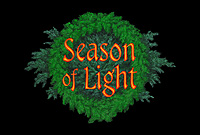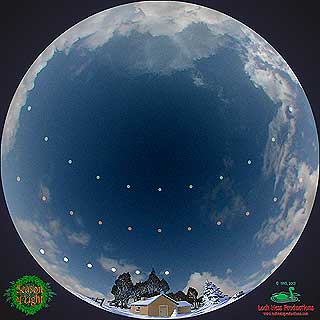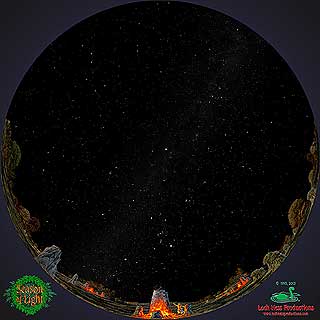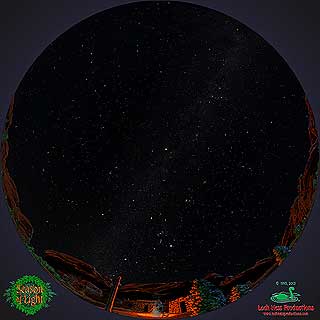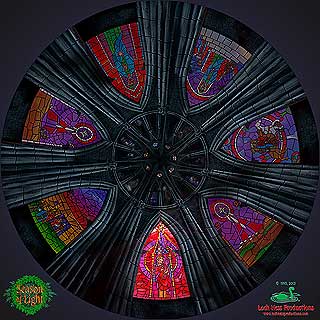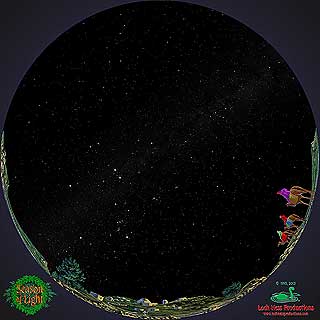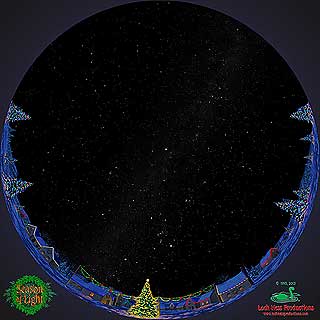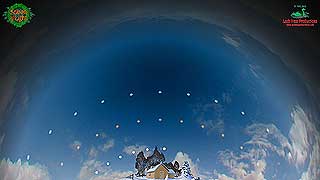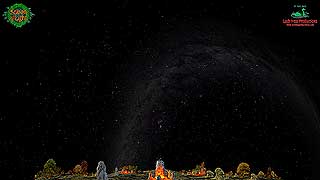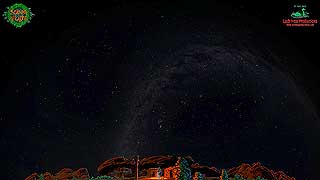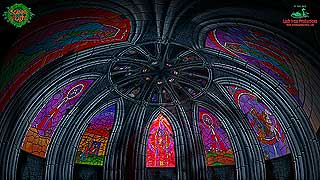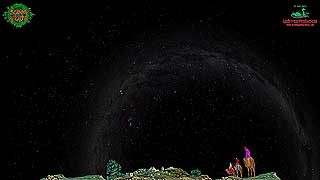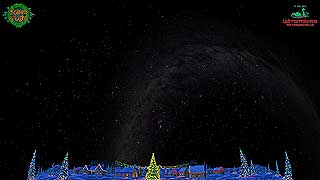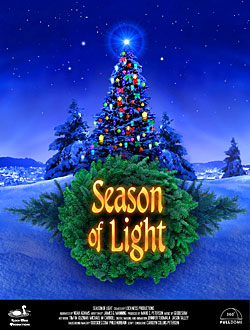
Narrated by Noah Adams
National Public Radio
Senior Correspondent
Season of Light
Light up the cold dark season with a warm and bright holiday show!
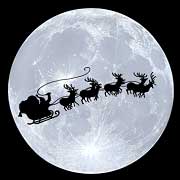 When the December holiday season rolls around each year, planetarians often present special programs that combine astronomy and holiday traditions. One of the most popular shows in the Loch Ness Productions repertory is Season of Light. It's an elegant and sophisticated program about the coldest and darkest of seasons — a time which holds some of the warmest and brightest celebrations of the year.
When the December holiday season rolls around each year, planetarians often present special programs that combine astronomy and holiday traditions. One of the most popular shows in the Loch Ness Productions repertory is Season of Light. It's an elegant and sophisticated program about the coldest and darkest of seasons — a time which holds some of the warmest and brightest celebrations of the year.
This presentation traces the history and development of many of the world's most endearing holiday customs, all of which involve lighting up the winter season — from the burning Yule log, sparkling Christmas tree lights and candles in windows, to the lighting of luminarias in the American Southwest and the traditional ritual of the Hanukkah Menorah.
The show also recounts the historical religious and cultural rituals practiced during the time of winter solstice — not only Christian and Jewish, but also Celtic, Nordic, Roman, Irish, Mexican and Hopi. 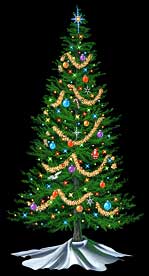 It also takes a look at some of our more light-hearted seasonal traditions: from gift-giving and kissing under the mistletoe, to songs about lords a-leaping and ladies dancing, and the custom of decking the halls with greenery and candles. St. Nicholas, Sinterklaas, Kris Kringle, Father Christmas, and Santa Claus all drop by as well.
It also takes a look at some of our more light-hearted seasonal traditions: from gift-giving and kissing under the mistletoe, to songs about lords a-leaping and ladies dancing, and the custom of decking the halls with greenery and candles. St. Nicholas, Sinterklaas, Kris Kringle, Father Christmas, and Santa Claus all drop by as well.
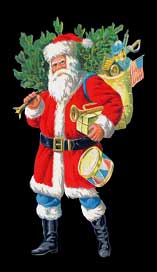 Naturally, there is some astronomy in Season of Light. Audiences learn a selection of Northern hemisphere winter constellations, and find out why we even have seasons, as we demonstrate the Sun's path across the sky throughout the year, and the Earth's tilt and orbit around the Sun. And of course, the program explores the possible astronomical explanations for a "Star over Bethlehem" in the last quarter of the show: comets, meteors, novae and supernovae, and planetary conjunctions.
Naturally, there is some astronomy in Season of Light. Audiences learn a selection of Northern hemisphere winter constellations, and find out why we even have seasons, as we demonstrate the Sun's path across the sky throughout the year, and the Earth's tilt and orbit around the Sun. And of course, the program explores the possible astronomical explanations for a "Star over Bethlehem" in the last quarter of the show: comets, meteors, novae and supernovae, and planetary conjunctions.
Season of Light is visually rich, culturally inclusive, musically satisfying, and soothing as a warm drink on a cold winter's night — and the perfect program for that end-of-the-year program slot!

Season of Light is a specialty program with an emphasis on astronomical and cultural themes related to the holiday season. Its educational impact is achieved through a set of multidisciplinary ideas woven throughout the program that help relate different holiday traditions and astronomy to the lives of students, families, and the general public.
Show content is relevant in these subject areas:
Earth and Space Sciences:- Sky objects: Sun, Moon, Venus, Jupiter
- Constellations: Orion, Canis Major, Canis Minor, Gemini, Taurus, Auriga, Leo
- Comets, stars, novae, supernovae, meteors
- Orbital motions of planets, lunar eclipse
- Change of seasons
Science History/Science as a human endeavor:
- Stargazing as a scientific activity
- Cultural connections between astronomy and holiday traditions
- Ancient use of astrology to predict events
- Ancient and modern perceptions of sky events and objects
1. Wasn't this show once called 'Tis The Season?
SHORT ANSWER: The classic show was.
LONG ANSWER: The script's original title was Season of Light. In 1992, when we acquired the rights to adapt the script to produce our classic planetarium show, we changed the name to 'Tis The Season. Our primary purpose was to avoid confusion with other, similarly-named shows marketed around that time. But more than a decade later, those old shows are just faded memories for most. So with the 2005 production of the fulldome version, we restored the show's first — and perhaps more appropriate — name.
2. Will you send me this show on approval? Before I can order it, my administrators are insisting they need to review the entire script first.
SHORT ANSWER: Not when you can preview the entire show here on our Web site! Just select the Previews link.
LONG ANSWER: Since 1993, this show has passed muster in more than 180 planetaria in the U.S., Canada, the U.K., the Netherlands, Japan, and Malaysia. Literally hundreds of thousands of people around the world have experienced it — and that includes administrators at least as priggish as yours. Truly, no one's found anything subversive or offensive in the show.
Here on our Web site, we provide a preview version of the entire show in streaming video form. Administrators, reviewers, anyone who wants to know any and every thing that's in the show can simply watch and listen from the comfort of their desktop.
3. Why isn't there anything about Kwanzaa in your Christmas show?
SHORT ANSWER: This show is about Yuletide customs, seasons, solstice celebrations, centuries-old traditions of bringing light to a dark time of year — and the Star of Bethlehem. Kwanzaa's practices and precepts are not directly related to any of these themes, and the traditional celebration of Kwanzaa urges the celebrants NOT to mix this celebration with any other culture or religion.
LONG ANSWER: While we are not at all insensitive to the beauty of the cultural precepts behind Kwanzaa, shoehorning it into a show about something else would be as awkward as including references to Al-Hijira or Ashura on the Islamic calendar, or Bodhi Day on the Buddhist calendar. Simply because many cultural festivities occur in December doesn't make them appropriate to mention in conjunction with Yuletide customs. To do so would likely be disrespectful to those whose beliefs encompass them.
According to the Official Kwanzaa Web Site (www.officialkwanzaawebsite.org), written by the founder, Dr. Maulana Karenga, the 7-day holiday was started in the U.S. in 1966 as part of a Pan-African cultural outreach, and originally conceived as a celebration of the first fruits of the harvest. While Kwanzaa begins on December 26, right after Christmas, it's pretty clear from the founder's intent that it is not be combined with any other Yuletide events and practices, as stated on the web site:
First, you should come to the celebration with a profound respect for its values, symbols and practices and do nothing to violate its integrity, beauty and expansive meaning. Secondly, you should not mix the Kwanzaa holiday or its symbols, values and practice with any other culture. This would violate the principles of Kujichagulia (Self-Determination) and thus violate the integrity of the holiday. Thirdly, choose the best and most beautiful items to celebrate Kwanzaa. This means taking time to plan and select the most beautiful objects of art, colorful African cloth, fresh fruits and vegetables, etc. so that every object used represents African culture and your commitment to the holiday in the best of ways.
Also from the Web site, the precepts of Kwanzaa:
- A time of ingathering of the people to reaffirm the bonds between them;
- A time of special reverence for the creator and creation in thanks and respect for the blessings, bountifulness and beauty of creation;
- A time for commemoration of the past in pursuit of its lessons and in honor of its models of human excellence, our ancestors;
- A time of recommitment to our highest cultural ideals in our ongoing effort to always bring forth the best of African cultural thought and practice; and
- A time for celebration of the Good, the good of life and of existence itself, the good of family, community and culture, the good of the awesome and the ordinary, in a word the good of the divine, natural and social.
Given all that, there's simply nothing astronomical/historical about Kwanzaa to warrant inclusion in an astronomical/historical show.
We've prepared a print-friendly version of this FAQ answer; select the link below. You're welcome to print out copies to distribute if any audience member asks.
Shows from Loch Ness Productions come with English language soundtracks standard. Translated soundtracks are provided as additional items, not substitutes for the English ones. If your show's movies contain multiplexed audio, you'll receive separate movie files for each language.
Don't see the language you want? Let's work together to create it. Read more here!



 Running time: 35:17
Running time: 35:17